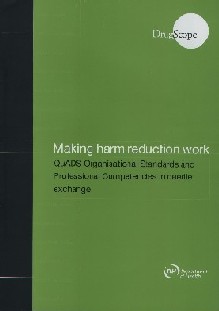|
Department of Health & Drugscope: Recommendations for Needle/Syringe Exchanges
The number of people who inject in England & Wales has been estimated at about 120,000. While needle and syringe sharing dropped in the 1980s and 1990s, this situation appears to have reversed. This has clear implications for hepatitis C, as the virus is quite easily tranmsitted through not only the sharing of needles and syringes but almost certainly through the sharing of paraphernalia such as cookers and filters.
It is quite clear from existing data that hepatitis C prevalence among some groups of injectors is already high, indeed as high as 80% in some parts of the United Kingdom.
Despite national clinical and commissioning guidelines already being in existence, research into service delivery in this field has shown that it is very poor in many areas. For example, delivery of hepatitis B vaccination is incredibly poor (many services dealing with injectors simply do not offer vaccination).
The Department of Health is very concerned about these low standards and, in partnership with Drugscope, has developed a series of booklets summarising the various edicts and recommendations in existence relating to harm reduction in drug use and injecting, including commissioning standards(see right - click on the picture for the "Drugscope" web site).
Hepatitis issues feature strongly in these recommendations, not only the need to improve hepatitis B vaccine uptake in "high risk " groups such as active drug injectors, but also the need for high awareness of hepatitis C, both among clients and staff. Indeed, the need for adequate training of staff in counselling, hepatitis C, hepatitis B (and vaccination), HIV and tuberculosis is heavily emphasised(see the excellent "TB Alert" leaflet and read about TB on "What's new page 5"), although hepatitis D (delta agent) is unfortunately not mentioned). Also, it is made clear that acute medical services are part of the equation of providing care for the patients.
The briefing booklets are supported by campaign materials targetting three key topics:
Hepatitis B vaccination (which protects against both hepatitis B and hepatitis D)
Reducing initiating into injecting
Overdose prevention
These booklets are an enormously valuable guide to good practice in the field of drug injecting services and they come from a background of the very highest level of approval and expectations. They can be obtained from Drug scope (see links page for web site and contact details, or click on the picture on the right).
|
 |
There is an important lesson to be learnt from the HIV experience of the 1980's and 1990's - treatment should not be divorced from prevention.
Accordingly, acute medical and nursing services for hepatitis C clearly have a role to play in the harm reduction and prevention processes - not only should they be providing the hospital-based expertise and services targetting the individual with hepatitis C, they should also be providing counselling and social support services and, furthermore, be able to offer expert leadership, guidance and training in all aspects of hepatitis C care (including clinical skills, counselling, vaccination issues, safer sex issues, family planning, co-infection with HIV and hepatitis B and D etc) to specialist drugs services, general practitioners and other key service providers. The social dimensions of hepatitis C, and especially counselling needs, are made clear in the new "Clinical guidelines on the management of hepatitis C" produced by the British Society of Gastroenterology (2001), the summary of which appears on "What's new page 4".
|
|
It is the sacred duty of a doctor to care for a patient and to relieve human suffering. Because of the seriousness of hepatitis C as a disease and because spread of this infectious disease between human beings is potentially preventable, it would be morally wrong for health professionals simply to concentrate on the bits of the process that they happen to like (clinical assessment and treatment, for example) while failing to fully involve themselves with the social and psychological aspects of dealing with hepatitis C, including drug use.
|
|
Improving the health and welfare of all patients, and most certainly those who use drugs, has to be what being a doctor is about. There is no doubt that the nursing, social work and medical management professions should also be aiming towards identical aspirations and objectives. Those who doubt this should consider reading the Department of Health publications and the NICE report for themselves.
Action on Hepatitis C
|
|
|
|
|
|
|
|
|
|
|
|